- Your cart is empty
- Continue Shopping
Hydroxychloroquine (HCQS) 200mg – Y
$29.00 – $38.50
Product Description
Hydroxychloroquine (HCQS) 200 mg is an antiprotozoal medication used to treat or prevent malaria (an illness caused by parasites that is spread through the bite of infected mosquitoes).
It is also used as an immunomodulatory and anti-inflammatory agent for the management of autoimmune and rheumatic diseases, such as rheumatoid arthritis and systemic lupus erythematosus (SLE), which is a chronic inflammatory condition that occurs when your immune system attacks the body affecting the skin, joint, brain, lungs, kidneys, and blood vessels.
An increasing body of evidence supports the beneficial impact of HCQS in various ancillary conditions, including diabetes mellitus and dyslipidemia (unhealthy levels of fats in the body).


What does Hydroxychloroquine (HCQS) 200mg contain?
This drug contains hydroxychloroquine (HCQ) which was initially used for the treatment and prophylaxis of malaria and is now considered a disease-modifying anti-rheumatic drug (DMARD) in patients with autoimmune diseases. It prevents disease flares, promotes long-term survival, and improves overall prognosis of patients with SLE. Furthermore, the antithrombotic effects of HCQ are beneficial in patients with SLE and antiphospholipid syndrome (APAS).
How does Hydroxychloroquine (HCQS) 200mg work?
This drug works by suppressing the immune system hyperactivity, which causes inflammation and pain in rheumatic disease, and down regulating immune response to malarial compounds. Furthermore, it has been suggested that hydroxychloroquine may improve insulin sensitivity and pancreatic beta-cell function, improving blood sugar control in patients with type 2 diabetes mellitus.
Who cannot take Hydroxychloroquine (HCQS) 200mg?
HCQS is not suitable for everyone. To make sure it’s safe for you, tell your doctor if you have any of the following:
- Allergic reaction to hydroxychloroquine/chloroquine or similar medicines, like quinolone and quinine
- Eye problem
- Glucose-6-dehydrogenase deficiency
- Skin condition psoriasis
- Blood condition porphyria
- Liver or heart problems
How should you take Hydroxychloroquine (HCQS) 200mg?
It is important to take the drug as your doctor tells you. Dosage depends on the condition being treated. For children, dosing depends on their weight. You may view Additional Information tab for recommended doses.
Swallow the tablet whole. Do not crush or chew it. Take them with or just after meals.
How long you take the drug for depends on why you’re taking it. For some conditions, you may need to take it for a few weeks or even for the rest of your life to control your symptoms.
It works gradually, and it may take weeks before you notice the benefits. Thus, it’s important to keep taking this drug until your doctor tells you to stop. Do not stop taking this drug even if you feel better as your symptoms may get worse. However, if you have been taking it for some time and you feel it is not helping you, talk to your doctor.
What if you miss a dose?
If you forget a dose, take it as soon as you remember. If it’s nearly time for your next dose, skip the missed dose and and take your next dose at the usual time. Do not take a double dose to make up for a missed dose.
What if you take too much?
Taking too much of the drug can cause problems. If you’ve taken more than your prescribed dose and you feel unwell, seek medical help immediately.
What are the side effects of Hydroxychloroquine (HCQS) 200mg?
HCQS is widely used in rheumatology and is generally safe and well-tolerated; however, some adverse effects have been reported. They are more likely when you first start taking it or after your dose is increased. They usually subside after a week or two. Consult your doctor if they persist or if you’re worried about them.
- Headache
- Nausea/vomiting, decreased appetite
- Diarrhea, abdominal pain
- Skin rash, itching
Serious and irreversible side effects may occur but are rare. Tell your doctor right away or contact an ambulance if you experience the following:
- Blurring of vision, sensitivity to light, changes in the way you see color
- Chest discomfort, rapid and pounding heartbeat, breathlessness with rest and little activity, swelling of legs/ankles/feet, difficulty lying flat to sleep – These may be symptoms of a heart condition called cardiomyopathy.
- Irrational thoughts, feeling anxious/depressed, hallucinations
- Muscle weakness, cramps, stiffness, tingling sensation
- Worsening skin rash and sensitivity to sun
What other precautions should be taken?
Children
Use is not recommended for children weighing less than 31kg. Safety and efficacy of hydroxychloroquine to treat lupus and arthritis have not been established in children.
Elderly
There are no age-specific contraindications for this drug in the geriatric population. However, elderly patients are more likely to have age-related kidney, liver, or heart problems, which may require caution and an adjustment in the dose for patients receiving this medicine.
Pregnancy
HCQS is generally safe for pregnant women, but let your doctor know if you are pregnant or planning to conceive a child.
Breastfeeding
It passes into the breastmilk in small amounts, but it has not been shown to cause side effects in breastfed babies. If, however, your baby seems unusual and irritable, consult your doctor.
Drug-Disease Interactions
Before taking this drug, tell your doctor if you have the following conditions. These health problems may affect how the drug works and severity of its side effects. Dose adjustments may be needed if you have any of the following:
- Recent heart attack
- Heart failure
- Problems in your heart rhythm/beat
- Low blood potassium and magnesium levels
- Myasthenia gravis
- Kidney problem
Drug-Drug Interactions
HCQS may affect how other drugs work. Conversely, other drugs may interfere with its action.
If you take antacids for indigestion, leave at least 4 hours between taking them and hydroxychloroquine as the former prevents the drug from being absorbed by the body. Tell your doctor if you are taking any of the following medications:
- Amiodarone or digoxin for the heart
- Azithromycin, erythromycin, clarithromycin antibiotics
- Medicines for epilepsy
- Medicines for diabetes, like insulin or metformin
- Cimetidine for stomach ulcers
- Methotrexate for rheumatoid arthritis/cancer
Alcohol
You can drink alcohol while taking this drug.
Driving
It’s usually safe to drive when taking this drug. However, it can sometimes make you feel dizzy or affect your eyesight. If this happens to you, do not drive or operate a machinery until you feel better.
Diet and Lifestyle
You can eat and drink normally while taking HCQS.
How should Hydroxychloroquine (HCQS) 200mg be stored?
Keep this medication out of child’s reach and sight. Furthermore, store at no more than 25°C. Keep your pills in their original package; do not move them to another container. Then, take this drug no later than the expiry date listed on the tablet and packaging after expiration date. The expiration date is the final day of that month. Lastly, do not dispose of pharmaceuticals in wastewater or household garbage. Inquire with your pharmacist about how to dispose of expired medications.
Quick Tips
- If you take this drug for a long time, regular follow-up with your doctor may be needed to monitor your full blood count, eye and muscle function, tendon reflexes, and heart activity, as needed.
- It can take a few weeks for it to work. Keep taking it as prescribed.
- Take it with food to avoid stomach upset.
What company produces Hydroxychloroquine (HCQS) 200mg?
| Ipca | CEO: Premchand Godha Founder: K.B. Mehla Dr. N.S. Tibrawala Founded: 1949 Headquarters: Mumbai, Maharashtra, India Number of employees: 12,000 Subsidiaries: Ramdev Chemicals Pvt. Ltd., Ipca Laboratories (UK) Limited, Tonira Pharma Ltd., Activa Pharmaceuticals, Bristol Pharma Australia Pty Ltd, Avik Pharmaceutical Ltd., IPCA Traditional Remedies Pvt. Ltd., IPCA Pharmaceuticals Ltd. SA de CV., Trophic Wellness Pvt. Ltd., Laboratories Ipca Do Brasil Ltda., Ipca Pharma (Australia) Pty Ltd., Ipca Pharma Nigeria Ltd, IPCA Pharmaceuticals (Shanghai) Co.Ltd, Sundridge Management Ltd., Ipca Pharmaceuticals, Inc., and National Druggist (pty) Ltd Website: www.ipca.com |
Additional Information
| Dosage | It is important to take the drug as your doctor tells you. Dosage depends on the condition being treated. For children, dosing depends on their weight. Prevention of malaria – In adults traveling to malarious areas without chloroquine resistance: 400 mg once weekly, starting 2 weeks before travel to the endemic area; continue weekly doses while in the endemic area and for 4 weeks after leaving the area. Treatment of malaria – For adults with chloroquine-susceptible malarial infection: Initially, 800 mg, then 400 mg at 6, 24, and 48 hours after the initial dose. Total dose: 2,000 mg. Alternatively, 800 mg as a single dose. Rheumatoid arthritis – Initially, 400-600 mg daily as a single dose or in 2 divided doses. Maintenance: 200-400 mg daily as a single dose or in 2 divided doses, according to response. Use the minimum effective dose. Maximum: 6.5 mg/kg daily. Discontinue treatment if there is no improvement within 6 months. Lupus – 200 mg once daily or 400 mg daily as a single dose or in 2 divided doses. Alternatively, an initial dose of 400-800 mg daily for several weeks, then reduce to maintenance of 200-400 mg daily according to response. Use the minimum effective dose. |
|---|---|
| Side Effects | Common side effects: Rare but serious side effects: |
| Contraindications | – Allergy to hydroxychloroquine/chloroquine or similar medicines, like quinolone and quinine |
| Pack Size | 30 Pills, 60 Pills, 90 Pills |
You must be logged in to post a review.


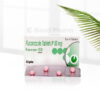
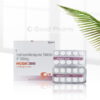
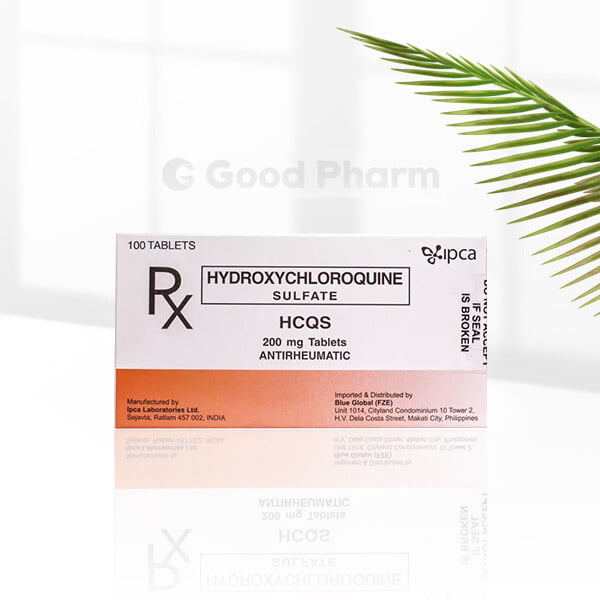

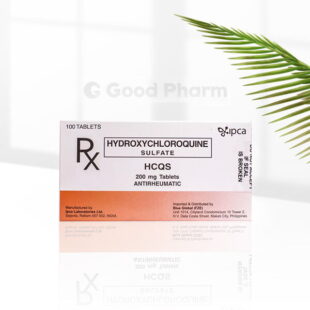
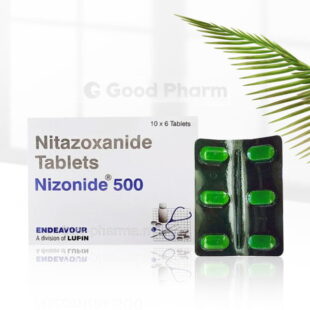
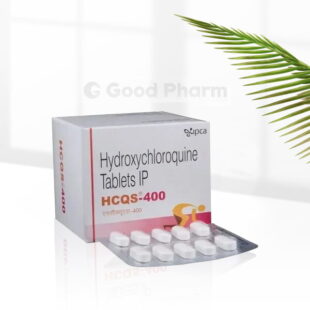
Reviews
There are no reviews yet.